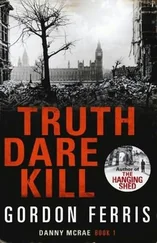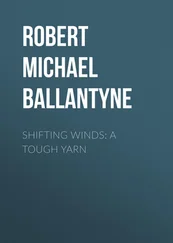Monica Ferris - A Murderous Yarn
Здесь есть возможность читать онлайн «Monica Ferris - A Murderous Yarn» весь текст электронной книги совершенно бесплатно (целиком полную версию без сокращений). В некоторых случаях можно слушать аудио, скачать через торрент в формате fb2 и присутствует краткое содержание. Жанр: Детектив, на английском языке. Описание произведения, (предисловие) а так же отзывы посетителей доступны на портале библиотеки ЛибКат.
- Название:A Murderous Yarn
- Автор:
- Жанр:
- Год:неизвестен
- ISBN:нет данных
- Рейтинг книги:3 / 5. Голосов: 1
-
Избранное:Добавить в избранное
- Отзывы:
-
Ваша оценка:
- 60
- 1
- 2
- 3
- 4
- 5
A Murderous Yarn: краткое содержание, описание и аннотация
Предлагаем к чтению аннотацию, описание, краткое содержание или предисловие (зависит от того, что написал сам автор книги «A Murderous Yarn»). Если вы не нашли необходимую информацию о книге — напишите в комментариях, мы постараемся отыскать её.
A Murderous Yarn — читать онлайн бесплатно полную книгу (весь текст) целиком
Ниже представлен текст книги, разбитый по страницам. Система сохранения места последней прочитанной страницы, позволяет с удобством читать онлайн бесплатно книгу «A Murderous Yarn», без необходимости каждый раз заново искать на чём Вы остановились. Поставьте закладку, и сможете в любой момент перейти на страницу, на которой закончили чтение.
Интервал:
Закладка:
“Do you know why all Fords were black?” asked Mike.
“Why?” asked Betsy, expecting another joke.
But Mike was serious. “Two reasons: first, because black paint dried quicker than any other color; and second, because it made supplying spare parts a snap. No need to try to figure out how many green fenders or blue doors or brown hood covers to stock when everything came in black. And all the parts were interchangeable, thanks to the assembly line method. People forget what a huge innovator Henry Ford was. He once said he could give his Model T’s away and make money just selling parts.”
When they got onto County Road 2, which was a busy two-lane highway, the old cars had to run on the shoulder. Cars rushed past, some honking in greeting, others in warning, one or two in anger. Mike summoned the Ford’s best speed, which came with even more noise and so much vibration Betsy wondered why parts weren’t shaken free.
“How fast are we going?” she asked, her voice sounding flat against the racket.
Mike checked his primitive instrument panel. “Twenty-eight mind-blowing miles an hour. What’s next?” he asked Dorothy.
“We’re on this for six miles,” she replied, “until we come to a Stop sign where Route Ten joins us and we turn left.”
“Okay,” he nodded.
Betsy tried to relax in the capacious back seat, stretching her arms out on either side. Seize the day, she told herself. The breeze made her light dress flutter against her legs, and kept her cool. She had wisely dabbed sun block on her face and arms this morning, so no fear of sunburn. She decided she liked riding up high and having her feet flat on the floor instead of resting on their heels. And in the open like this, and at this slow a speed, there was plenty of time to look around and enjoy the sights and smells of the countryside. Unlike in the Stanley, with its low sides, in the Model T she felt very much “inside” and safe, and so didn’t mind the lack of a seat belt very much.
But the noise was such that she soon gave up trying to talk with Mike and Dorothy.
In a little over an hour they came into Pine Grove and pulled over behind a row of antique cars for a pit stop at the Home Town Café. Betsy climbed out, dusty, windblown, and a little deaf from the noise of the engine. She crossed the highway, surprised at her unsteady pace. That jiggle was really something, especially when it stopped.
Pine Grove was a hamlet strung along one side of the highway, the other side marked by a well-maintained railroad line. She looked around, at the dusty buildings, the flat landscape, the old cars. She’d admired the people who made the movie Paper Moon for traveling around the Midwest in a search for authentic dirt roads and small towns, thinking then it must have been hard to find them; but they’d traveled down a dirt road a while back, and here was an authentically shabby little town, right on a highway, not hard to find at all.
Betsy felt as if her brain had shaken loose during the ride. She had gone into some strange, reflective mode-not the kind that comes from actual meditation, but the kind that comes from heavy-duty pain pills. Everything had become a tinge unreal. She saw an elderly man sitting very erect on a bench in front of the café, and wanted to go ask him if he’d fought in the Civil War, just to see if he’d cackle and tell her a story about Gettysburg. Of course, another part of her knew that question was better asked of the old man’s great-grandfather, that she was caught up in the pseudo-reality of a moving picture. This was the early twenty-first century, not the early twentieth. Right? She began to look for an anachronism to prove it. Like in the movie Gladiator, spoiled for her when the ancient Romans handed out hastily printed leaflets. The movie makers had apparently forgotten the printing press was at least ten centuries forward from ancient Rome.
And now, here came a good anachronism in the form of a train rumbling down the tracks behind the row of cars. The engines pulling the train were diesels, which didn’t replace steam engines until the fifties. She waved gratefully at it, and watched the whole train rumble by. It was long, mostly grain cars. There was no little red caboose at the end, which made her feel sad.
She went into the café and bought a Diet Coke, which came in an aluminum can. Aluminum, she knew, was once an extremely rare metal, so rare that the builders of the Washington Monument paid huge sums for enough to cap the point, forgoing the far less expensive gold or platinum.
Times change in unexpected ways, she reflected, and no period movie ever gets it exactly right. Especially when it came to women’s hairdos; no matter how authentic the costumes, you could always tell when a movie was made by the way the lead actress wore her hair.
The people were sitting at tables talking about cars and the trip, but also about other things: “It’s not the size of the boat, but its ability to stay in port until all the passengers have disembarked,” said a man in a low voice with a hint of a snigger in it. He was the same man who earlier couldn’t “pea” soup.
A woman was saying to another woman, “And then, darling, when the judge called for a trot, that woman behind me went into a rack, I am not kidding, a rack! And the judge gave her the blue ribbon! I nearly fell off my horse, but decided instead I’d had enough of showing Arabians, and I sold Sheik’s Desire the next week and bought the Yale that Tom had been panting after.”
A man boasted with a hint of regret, “I had her up to forty last week, on that downhill slope on County Five, but she was shaking so hard I thought a wheel had come loose. She hasn’t been the same since. I think she scared herself. I know she scared me.”
Betsy didn’t see Lars and Jill, but that didn’t surprise her; she hadn’t seen the Stanley outside, either. They must have already stopped and gone on, or not stopped at all, more likely. After having been beaten last Saturday, Lars was probably determined to arrive first in Litchfield.
Although this was not, of course, a race.
What was a bit more problematic was that Mike and Dorothy weren’t there, either.
Betsy took her Coke outside, to be reassured by the sight of the Model T still parked across the street. They must be in the restrooms, she thought. Two drivers came out and started cranking their cars. The driver of the REO had to adjust his magneto twice before the engine caught. Grunge, grunge, grunge, it complained, before he pulled out well behind the other and putt, putt, putt-putt-putt, started up the road.
She watched him diminish to a heat-waved mirage then heard a sound-not quite like a modern car, but not like the rickety sound of an old one, either. She turned and saw something spectacular coming up the road, to pull off behind the Model T.
It was a gorgeous antique limousine, tall and long, a rich, royal blue with inlaid brass stripes on the hood and along the back door. The back seat was under a black leather roof, but the front seat wasn’t. There was a kind of second windshield behind the front seat, with hinged wings to further enclose the rear passenger compartment, which appeared to be empty. The very distinctive hood sloped downward to the nose, then sloped very steeply down and forward to the front bumper. The radiator was behind the hood, sticking out around the edges. The tires were fat, the heavy wooden spokes of the wheels painted creamy white. The engine, ticking gently over, stopped, and a man shifted over to the passenger side and climbed out. He was slim, broad-shouldered, and extremely elegant in royal blue riding pants, the old-fashioned kind with wings, and black leather gaiters with buckles. He wasn’t wearing a coat or jacket, but an immaculate white shirt whose upper sleeves were encircled by royal blue garters, and as he got out, he took off a royal blue cap with a narrow black bill and wiped his brow with the back of his hand.
Читать дальшеИнтервал:
Закладка:
Похожие книги на «A Murderous Yarn»
Представляем Вашему вниманию похожие книги на «A Murderous Yarn» списком для выбора. Мы отобрали схожую по названию и смыслу литературу в надежде предоставить читателям больше вариантов отыскать новые, интересные, ещё непрочитанные произведения.
Обсуждение, отзывы о книге «A Murderous Yarn» и просто собственные мнения читателей. Оставьте ваши комментарии, напишите, что Вы думаете о произведении, его смысле или главных героях. Укажите что конкретно понравилось, а что нет, и почему Вы так считаете.












